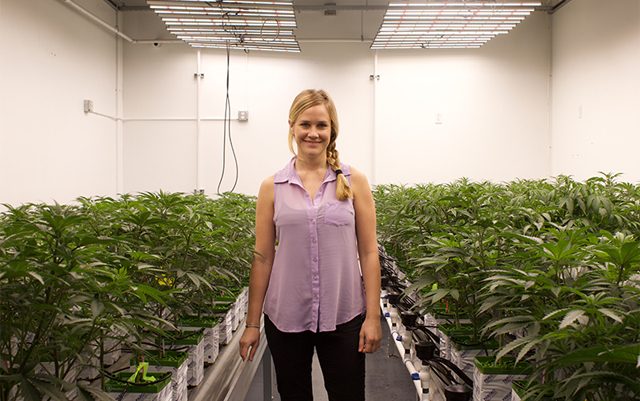Plant scientist Allison Justice is the VP of Horticulture at Outco California. The cannabis company prides themselves on their indoor and greenhouse harvests, which are grown with sustainable methods, using beneficial insects, fungi and organic oils to ensure top quality. Rooted in science, the company believes in the continuous development of the cannabis industry through research and development.
Dr. Allison Justice graduated from Clemson University with a PhD in Plant & Environmental Science. During her time at Clemson, Allison taught Greenhouse Management to undergraduate students where they focused on organic methods and production. An expert outside the cannabis industry, OutCo was eager to bring her onto the team to help bring the best plant experts to the cannabis space.
Right now, there’s lots of opinions from hobby growers, says Dr. Justice. That’s why it’s so important to bring legitimacy to the cultivation side, from a scientific standpoint – through chemistry and horticulture.
Post-graduation Allison developed a system (patent pending) to mass rear beneficial nematodes for commercial use that led her to consulting on integrated pest management nationwide.
“A Nematode is a micro worm – a good bug that eats the bad bugs,” she explains. Many growers are using it in cannabis too, as an alternative to pesticides. “Think of them as little army men that take care of the bad insects.”
An expert on those ‘bad bug eaters’, among other avenues of horticulture, Allison sees endless possibilities to sustainable cannabis cultivation. A big fan of science, she’s working to set the standards for the industry as she seeks to become a leader in cannabis cultivation with best practices guided by data and scientific methods.
Currently, she is perfecting a new OutCo cannabis greenhouse, which she designed in the San Diego area. The first of its kind, the automated greenhouse can turn six crops a year, making it easy to collect data on every aspect of growing the plant.
“I got to design it from ground up, everything from blackout curtains to irrigation,” she explains, “We took it to the next level. I have a ton of experience in designing other greenhouses – like poinsettias, and there are a lot of parallels between the plants; the greenhouses are exactly the same.”
The automated system she designed isn’t your standard cannabis system.
The blackout curtains allow her greenhouse to turn six crops a year – and the high level of bio-security they are implementing means that growers will be fully sanitized and bug-free before working with the plants. The computer system will record everything from lights and fertilizer input to humidity levels.
“We are hoping we get to standardize and optimize the conditions up to individual strains that have different growing perimeters,” she explains. “How much light they need daily is only a fraction of the data that will be automatically collected, and we can show the growers what the plants like, and eventually even publish our findings.” Her first crop will be harvested May 15.






